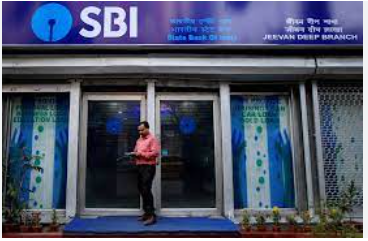State Bank of India (SBI)
The State Bank of India (SBI) is an Indian multinational public sector banking and financial services statutory body headquartered in Mumbai, Maharashtra. SBI is the 43rd largest bank in the world and ranked 221st in the Fortune Global 500 list of the world’s biggest corporations of 2020. It is a public sector bank and the largest bank in India with a 23% market share by assets and a 25% share of the total loan and deposits market.
History
The Bank of Calcutta (later renamed the Bank of Bengal) was established on 2 June 1806. The Bank of Bengal was one of three Presidency banks, the other two being the Bank of Bombay (incorporated on 15 April 1840) and the Bank of Madras (incorporated on 1 July 1843). The Presidency banks were amalgamated on 27 January 1921, and the re-organized banking entity took as its name Imperial Bank of India. The Imperial Bank of India remained a joint-stock company but without Government participation.
In 1955, the Imperial Bank of India, along with several other banks, became the State Bank of India after the passing of the State Bank of India Act, 1955. On 30 April 2017, the State Bank of India, which was India’s largest bank, merged with five of its associate banks (State Bank of Bikaner & Jaipur, State Bank of Hyderabad, State Bank of Mysore, State Bank of Patiala, and State Bank of Travancore) and Bharatiya Mahila Bank, making it an even larger bank.
Products and Services
SBI offers a wide range of banking products and services to corporate and retail customers, including:
- Savings accounts
- Current accounts
- Fixed deposits
- Recurring deposits
- Home loans
- Car loans
- Education loans
- Personal loans
- Credit cards
- Debit cards
- Insurance products
- Mutual funds
- Forex services
- Mobile banking
- Internet banking
Digital Initiatives
SBI has been at the forefront of digital banking in India, launching various digital initiatives to provide customers with a seamless banking experience. Some of these initiatives include:
- YONO (You Only Need One): A digital banking platform that offers a wide range of financial and lifestyle services.
- SBI Anywhere: A mobile banking app that allows customers to perform various banking transactions on the go.
- SBI Intouch: A digital branch that offers services through self-service kiosks and interactive displays.
- SBI Pay: A mobile wallet that allows customers to make payments and transfer funds using their smartphones.
CSR and Sustainability
SBI is committed to corporate social responsibility (CSR) and sustainability. The bank has undertaken various initiatives in the areas of education, healthcare, environment, and rural development. Some of these initiatives include:
- SBI Youth for India Fellowship: A program that engages young professionals in rural development projects.
- SBI Gram Seva: An initiative to provide basic banking services in unbanked and underbanked areas.
- SBI Green Marathon: An event to promote environmental awareness and sustainability.
- SBI Children’s Welfare Fund: A fund to support the education and healthcare of underprivileged children.
Awards and Recognitions
SBI has received numerous awards and recognitions for its performance and initiatives. Some of these include:
- Best Public Sector Bank Award by Business Today (2019)
- Best Digital Bank Award by Financial Express (2019)
- Best Bank for CSR by Asiamoney (2019)
- Most Trusted Bank in India by Brand Trust Report (2020)
With its wide range of products and services, digital initiatives, and commitment to CSR and sustainability, SBI continues to be a leader in the Indian banking industry. As the bank adapts to the changing needs of its customers and the evolving digital landscape, it remains well-positioned to maintain its leadership position and contribute to the growth and development of the Indian economy.


